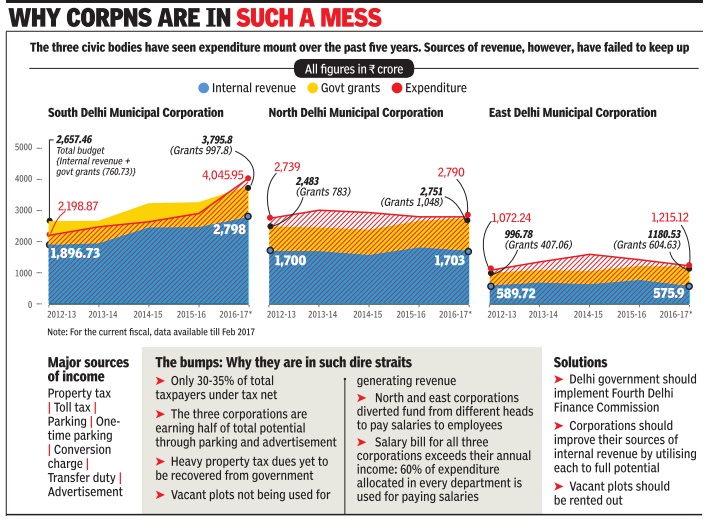Delhi: municipal corporations
This is a collection of articles archived for the excellence of their content. |
Status of finances, performance
2017: a poor state
Mayank Manohar, Finances stagnate amid blame-game, Mar 16, 2017: The Times of India

From revenue generation to ensuring basic services, our corporations have failed to deliver.
The inability of the East Delhi Municipal Corporation to pay salaries to its employees, which left the region in ankle-deep garbage when sanitation workers struck work in 2015, drew attention to the failure of the capital's three municipal bodies to cushion their finances with effective revenue generation. This was further emphasised when delays in salary payment led to more such strikes in the north and east corporations.
Apart from their share of the taxes that Delhi government collects, the corporations earn revenues through property tax, parking charges, advertisements and various levies and tolls. While the BJP-led civic bodies blame the state government for restricting their spending power by not implementing the recommendation for a bigger share in taxes made by the Fourth Delhi Finance Commission, the truth is they haven't themselves done much to ease their pain.
For instance, they have brought only around 30% of the property owners into the tax net, with several initiatives to haul up defaulters failing due to political intervention. The unique property identification code survey , which was to bring all properties within the tax fold within 18 months, remains incomplete even after two years. Tax rates have not been hiked in a decade either.
Only the south body garnered a fairly healthy Rs 700 crore as property tax this fiscal. A north corporation official argued this was because “properties in south Delhi have more value than in the north“. An official in east Delhi, where only 2.3 lakh of the 9 lakh properties are taxed, similarly claimed, “Here, 258 colonies are unauthorised, only 90 are regularised. Besides, there are no affluent A or B category colonies in east Delhi, affecting our tax collection.“
And yet, low tax collection hasn't deterred the poll-bound corporations from recently proposing to do away with the conversion charge to benefit traders.
It is this sort of political pandering that has hit another source of revenue: advertisments. The civic bodies pulled in just a third of the projected earnings under this head, while failing dismally at checking illegal ads. “We are short-staffed and find it impossible to monitor every advertising pole,“ explained a south official, adding quietly that it was frequently political parties and leaders who used their clout to illegally put up advertisements.
Shailendra Singh Monty , standing committee chairman in the south corporation, however, claimed that things had improved. “Earlier, no one went against the parking and advertisement mafia,“ he said. “But we removed all illegal advertisements and so improved our ad earnings by almost Rs 60 crore this fiscal.“
While VP Pandey , leader of the house in the north body , refreshingly admitted that the dismal financial condition could be attributed to its “lethargic“ officials, he offered no corrective measures.“The potential for revenue generation is immense, but the lethargic approach of officials has affected our revenues,“ he asserted. “We have to adopt new methods to increase our earnings. We are not a profit-making organisation, only a service provider. But there still is a need to bring in financial stability .“
Every year, the corporations fail to meet the revenue targets by 10-15%, though officials say this is due partly to political leaders proposing unrealistic revenue targets in the budget. Satya Sharma, mayor of the east corporation, said this could be history soon. “We have taken several initiatives, including opening new parking lots, including more people in the property tax net and creating a new advertisement policy ,“ Sharma said. “These steps have increased our revenue by almost 70%, and we should be able to do more through our online facility for factory licensing.“
Almost 75% of the total earnings of the civic bodies goes into the payment of salaries and pensions. This has left the municipalities in east and north Delhi perennially struggling to balance the books, with only the south corporation comparatively better off in this regard.